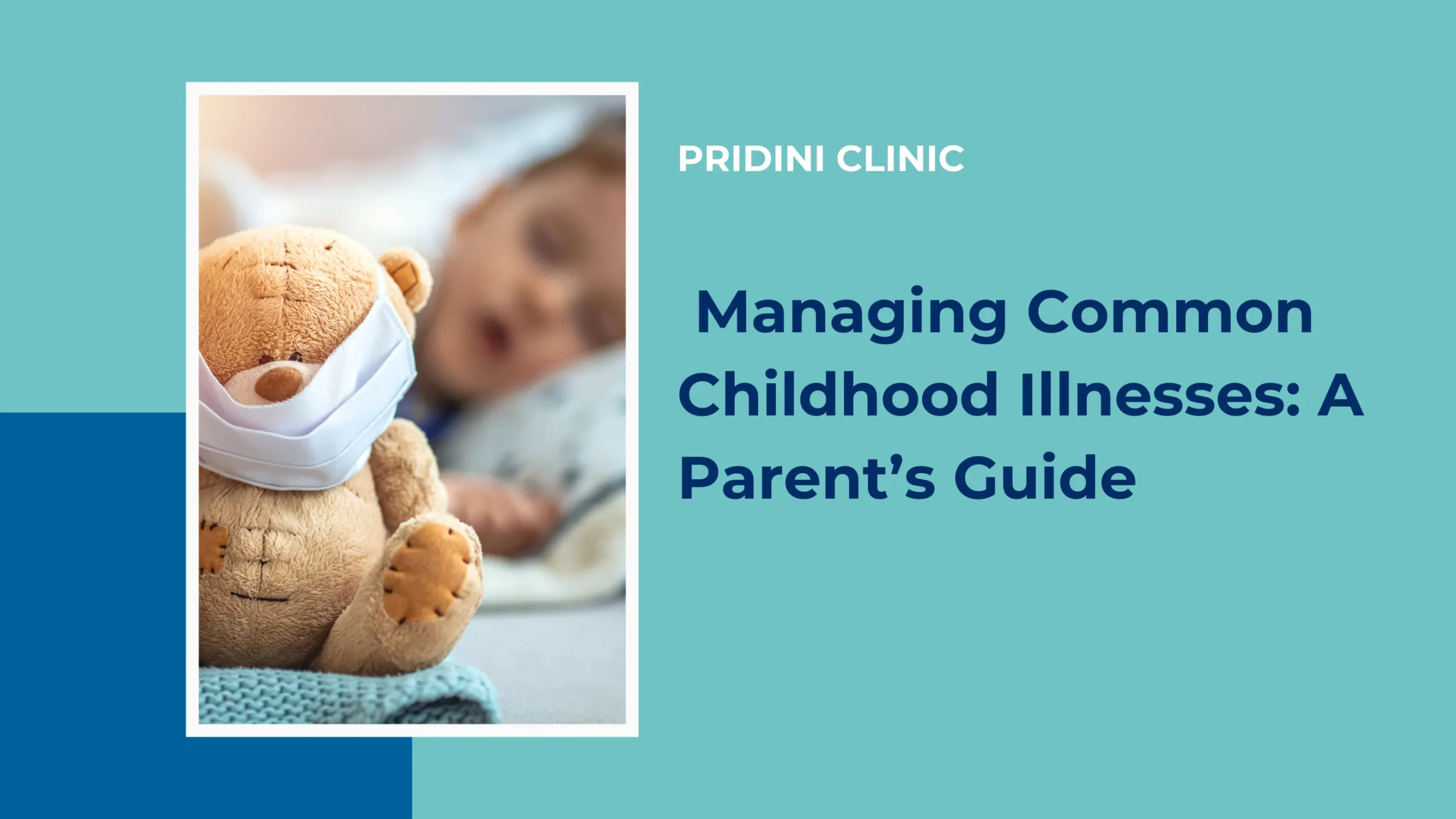As a parent, safeguarding your child’s health and well-being is one of your top priorities. Childhood is a time of rapid growth and development, but it also comes with its share of illnesses. While most childhood illnesses are mild, knowing how to recognize symptoms early and when to seek medical attention is crucial. At Pridini Clinic, we are dedicated to providing parents with the knowledge and tools needed to manage common childhood illnesses effectively. This guide will cover the most common childhood illnesses, how to recognize symptoms, when to seek medical help, effective home care tips, the importance of vaccinations, and strategies for keeping your child healthy during cold and flu season.
Understanding the Most Common Childhood Illnesses
Due to their developing immune systems, children are particularly vulnerable to illnesses. Among the most common childhood illnesses are:
- Colds: Caused by various viruses, colds are characterized by a runny or stuffy nose, sneezing, coughing, and a sore throat.
- Ear Infections: Often following a cold, ear infections can cause ear pain, fever, and irritability.
- Strep Throat: A bacterial infection that causes a sore throat, fever, and swollen lymph nodes.
- Chickenpox: A highly contagious virus that causes an itchy rash, fever, and fatigue.
- Gastroenteritis (Stomach Flu): Characterized by vomiting, diarrhea, and stomach cramps, often caused by viruses.
- Hand, Foot, and Mouth Disease: A viral illness that causes sores in the mouth and a rash on the hands and feet.
- Influenza (Flu): A viral infection with symptoms including fever, chills, body aches, and fatigue.
How to Recognize Symptoms Early
Watch for these common symptoms:
- Fever: A rise in body temperature often indicates the body is fighting an infection.
- Coughing and Sneezing: Typical symptoms of respiratory infections, such as colds or the flu.
- Rash: Skin rashes can indicate viral infections like chickenpox or hand, foot, and mouth disease.
- Vomiting and Diarrhea: These symptoms are common in stomach viruses and require careful hydration.
- Ear Tugging: If your child frequently tugs at their ear and seems irritable, it could indicate an ear infection.
By monitoring your child for these symptoms, you can provide early care and prevent the illness from worsening.
When to Seek Medical Care for Your Child
While many childhood illnesses can be managed at home, there are times when medical attention is necessary. It’s important to seek medical attention if your child shows any of the following signs:
- High Fever: A fever above 104°F or lasting more than a few days should be evaluated by a doctor.
- Difficulty Breathing: If your child struggles to breathe, has rapid breathing, or is wheezing, seek medical help immediately.
- Severe Pain: Persistent or severe pain, especially in the ear, throat, or abdomen, requires a medical evaluation.
- Dehydration: Signs of dehydration include dry mouth, lack of tears when crying, and decreased urine output.
- Unusual Drowsiness or Irritability: If your child is unusually sleepy or irritable and cannot be easily comforted, it’s time to see a doctor.
Trust your instincts as a parent—if something doesn’t seem right, it’s always better to consult with a healthcare professional.
Effective Home Care Tips for Managing Illnesses
Most mild childhood illnesses can be managed at home with the following tips:
- Keep Your Child Hydrated: Encourage fluids like water, clear broths, and electrolyte solutions to prevent dehydration, especially during fever or diarrhea.
- Ensure Rest: Rest is crucial for recovery. Keep your child comfortable and allow them to sleep as much as needed.
- Use Over-the-Counter Medications Wisely: Medications like acetaminophen or ibuprofen can help reduce fever and relieve pain. Always follow the dosing instructions carefully.
- Provide a Comfortable Environment: Keep the room cool, use a humidifier for easier breathing, and ensure your child has easy access to tissues and water.
- Practice Good Hygiene: Wash your hands frequently and teach your child to do the same to prevent the spread of illness to others in the household.
The Importance of Vaccinations in Preventing Childhood Illnesses
Vaccinations play a critical role in protecting your child from serious illnesses. Vaccines help build immunity against diseases like measles, mumps, rubella, whooping cough, and influenza. Ensuring that your child’s vaccinations are up to date is one of the most effective ways to prevent the spread of contagious diseases.
Regular immunizations not only protect your child but also contribute to the community’s health by preventing outbreaks of preventable diseases.
Strategies for Keeping Your Child Healthy During Cold and Flu Season
Cold and flu season can be particularly challenging for parents. Maintaining your child’s health during this time requires a proactive approach. Here are some strategies to help keep your child healthy:
- Encourage Handwashing: Teach your child to wash their hands frequently with soap and water, especially before eating and after using the bathroom.
- Boost Immunity with a Healthy Diet: Provide a balanced diet rich in fruits, vegetables, whole grains, and lean proteins to support your child’s immune system.
- Ensure Adequate Sleep: Ensure your child gets enough sleep each night, as rest is vital for a strong immune system.
- Limit Exposure to Sick Individuals: Keep your child away from individuals who are sick, and avoid crowded places during peak flu season.
- Make sure your child gets their annual flu vaccination. The flu vaccine is important in preventing the flu and its complications.
At Pridini Clinic, we are committed to helping you keep your child healthy and safe. If you have concerns about your child’s health or need guidance on managing an illness, don’t hesitate to contact us for expert care and support.



